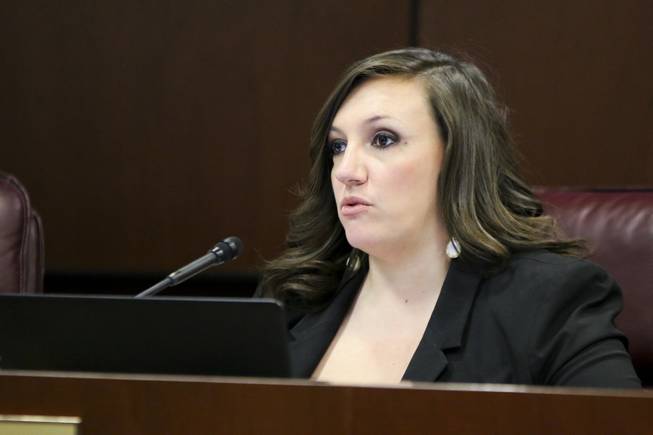
State Sen. Nicole Cannizzaro, D-Las Vegas, speaks during a Senate Judiciary Committee hearing in Carson City on Friday, June 2, 2017.
Published Tuesday, Feb. 6, 2018 | 3:51 p.m.
Updated Wednesday, Feb. 7, 2018 | 5:08 p.m.
Challenges to two Democratic state senators’ recalls came before a judge Wednesday, possibly setting the cases up for appeal to higher courts.
Two state-level lawsuits against the recalls of Sens. Joyce Woodhouse and Nicole Cannizzaro were heard in district court. Lawyers on both sides expect that if the judge decides whether the recalls will go forward, the cases will be appealed, possibly all the way to the state Supreme Court.
Attorneys have a week to turn in proposals to the judge of what they’d like a ruling to look like. It is up to the judge’s discretion when the ruling will be released, and what the decision will be. The crux of the ruling may rest on the validity of petitions from voters who want their signatures removed from the recall petitions.
Another federal lawsuit seeking a preliminary injunction in the recalls is on hold pending the outcome of the state-level cases.
A recall election would cost more than $51,000 in Cannizzaro’s district and more than $50,000 in Woodhouse’s district, according to the Clark County Registrar of Voters.
Democrats fighting the recalls contend many signatures are invalid and thousands of others have been requested to be removed by the signers.
“Much as in Senate District 5 against Senator Joyce Woodhouse, extensive review of the petitions and signature removal forms has found that Republicans are far below the necessary signature threshold, and that they will not be able to surmount the deficit,” attorney Bradley Schrager of Wolf Rifkin said in a Dec. 27 statement. “We are eager to present our challenge in district court, and have high confidence that the court will halt this abuse of Nevada’s recall laws in its tracks.”
The law firm of Hutchison & Steffen was initially retained by the recall committees to ensure the process was done legally. The firm is also defending the recalls in these two lawsuits, arguing that elections officials have said the signatures qualify and that the elections should be ordered.
Nevada attorney Sean McDonald, who is not involved in the lawsuits, said Wednesday that the judge asked few questions, making it difficult to predict what the ruling will be. Regardless, he said, the case is likely to be appealed.
The two key issues at play, he said, is whether the recall signatures were properly counted and the signature removal process should go forward. With the two senators targeted for recall in the courtroom, as well as political leaders including Sen. Majority Leader Aaron Ford, McDonald said the political implications of the case were clear.
“The court realizes that what motivates this recall election at its base is a partisan political process,” McDonald said. “The court I think reassured the parties and those attending in the gallery that that’s not the court’s role. The court’s role is to dispassionately look at the record, look at the information put in front of him, and to be guided by what the law instructs and not to be guided by what the partisan political leanings might dictate.”
The recalls could change the balance of the Senate, where there are eight Republicans and 10 Democrats, including Cannizzaro and Woodhouse. The senators targeted for recall both represent districts where registered Democratic voters outnumber Republicans by several thousand votes, with GOP voter turnout stronger than Democrats in off-year elections.
In the 2014 General Election, Democrats represented 37 percent of ballots cast compared to Republicans’ 44 percent. In the 2016 General Election, Democrats accounted for 40 percent of ballots cast versus 36 percent for Republicans.
Another recall attempt targeting Independent Sen. Patricia Farley, who caucused with Democrats in 2017, failed to gather enough signatures. She is not pursuing reelection due to family reasons. In addition to two vacant seats and Farley’s departure, three Democrats and one Republican whose Senate terms expire in 2020 are running for a different office. Republican Michael Roberson would have been up for reelection this year but is running for lieutenant governor.
Republicans had an edge on active voter registration in seven Senate districts as of January, while Democrats had the upper hand in 11. Two Senate swing districts will be open this election with the departures of Farley and Roberson.
Lt. Gov. Mark Hutchison gave arguments on behalf of the recall proponents. As Lt. Gov., Hutchison is president of the state Senate.
McDonald said it’s unusual for an official to make legal arguments seeking the recall of two senators who serve in the same chamber that he is part of, though not typically as a voting member.
He said the case weighs the right of a portion of voters to recall someone they’ve elected versus the right of residents not to be burdened by the cost and effort of holding unnecessary recall elections.
“That’s a tension that I think this case really puts into sharp relief,” McDonald said.

Join the Discussion:
Check this out for a full explanation of our conversion to the LiveFyre commenting system and instructions on how to sign up for an account.
Full comments policy